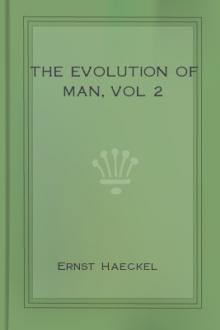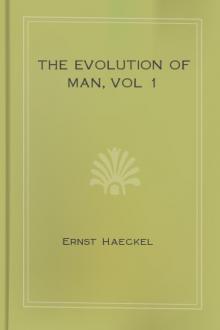author - "Ernst Haeckel"

I do not know, but it must be bad indeed if it inculcates more falsities than are at present foisted upon the young in the name of the Church.I make these remarks simply in the interests of fair play. Far be it from me to suggest that it is desirable that the inculcation of the doctrine of evolution should be made a prominent feature of general education. I agree with Professor Virchow so far, but for very different reasons. It is not that I think the evidence of that doctrine insufficient, but

plete idea of the past development ofman's ancestors within the vertebrate stem by putting together andcomparing the embryological developments of the various groups ofvertebrates. And when we go below the lowest vertebrates and comparetheir embryology with that of their invertebrate relatives, we canfollow the genealogical tree of our animal ancestors much farther,down to the very lowest groups of animals.In entering the obscure paths of this phylogenetic labyrinth, clingingto the

years ago, a distinguishedbiologist wrote in the Frankfurter Zeitung that it would secureimmortality for its author, the most notable critic of the idea ofimmortality. And the Daily Telegraph reviewer described the Englishversion as a "handsome edition of Haeckel's monumental work," and "anissue worthy of the subject and the author."The influence of such a work, one of the most constructive thatHaeckel has ever written, should extend to more than the few hundredreaders who

Ernst Heinrich Philipp August Haeckel (German: [ˈhɛkəl]; February 16, 1834 – August 9, 1919[1]) was a German biologist, naturalist, philosopher, physician, professor, and artist who discovered, described and named thousands of new species, mapped a genealogical tree relating all life forms, and coined many terms in biology, including anthropogeny, ecology, phylum, phylogeny, stem cell, and the kingdom Protista. Haeckel promoted and popularized Charles Darwin's work in Germany and developed the

Ernst Heinrich Philipp August Haeckel (German: [ˈhɛkəl]; February 16, 1834 – August 9, 1919[1]) was a German biologist, naturalist, philosopher, physician, professor, and artist who discovered, described and named thousands of new species, mapped a genealogical tree relating all life forms, and coined many terms in biology, including anthropogeny, ecology, phylum, phylogeny, stem cell, and the kingdom Protista. Haeckel promoted and popularized Charles Darwin's work in Germany and developed the

Ernst Heinrich Philipp August Haeckel (German: [ˈhɛkəl]; February 16, 1834 – August 9, 1919[1]) was a German biologist, naturalist, philosopher, physician, professor, and artist who discovered, described and named thousands of new species, mapped a genealogical tree relating all life forms, and coined many terms in biology, including anthropogeny, ecology, phylum, phylogeny, stem cell, and the kingdom Protista. Haeckel promoted and popularized Charles Darwin's work in Germany and developed the

I do not know, but it must be bad indeed if it inculcates more falsities than are at present foisted upon the young in the name of the Church.I make these remarks simply in the interests of fair play. Far be it from me to suggest that it is desirable that the inculcation of the doctrine of evolution should be made a prominent feature of general education. I agree with Professor Virchow so far, but for very different reasons. It is not that I think the evidence of that doctrine insufficient, but

plete idea of the past development ofman's ancestors within the vertebrate stem by putting together andcomparing the embryological developments of the various groups ofvertebrates. And when we go below the lowest vertebrates and comparetheir embryology with that of their invertebrate relatives, we canfollow the genealogical tree of our animal ancestors much farther,down to the very lowest groups of animals.In entering the obscure paths of this phylogenetic labyrinth, clingingto the

years ago, a distinguishedbiologist wrote in the Frankfurter Zeitung that it would secureimmortality for its author, the most notable critic of the idea ofimmortality. And the Daily Telegraph reviewer described the Englishversion as a "handsome edition of Haeckel's monumental work," and "anissue worthy of the subject and the author."The influence of such a work, one of the most constructive thatHaeckel has ever written, should extend to more than the few hundredreaders who

Ernst Heinrich Philipp August Haeckel (German: [ˈhɛkəl]; February 16, 1834 – August 9, 1919[1]) was a German biologist, naturalist, philosopher, physician, professor, and artist who discovered, described and named thousands of new species, mapped a genealogical tree relating all life forms, and coined many terms in biology, including anthropogeny, ecology, phylum, phylogeny, stem cell, and the kingdom Protista. Haeckel promoted and popularized Charles Darwin's work in Germany and developed the

Ernst Heinrich Philipp August Haeckel (German: [ˈhɛkəl]; February 16, 1834 – August 9, 1919[1]) was a German biologist, naturalist, philosopher, physician, professor, and artist who discovered, described and named thousands of new species, mapped a genealogical tree relating all life forms, and coined many terms in biology, including anthropogeny, ecology, phylum, phylogeny, stem cell, and the kingdom Protista. Haeckel promoted and popularized Charles Darwin's work in Germany and developed the

Ernst Heinrich Philipp August Haeckel (German: [ˈhɛkəl]; February 16, 1834 – August 9, 1919[1]) was a German biologist, naturalist, philosopher, physician, professor, and artist who discovered, described and named thousands of new species, mapped a genealogical tree relating all life forms, and coined many terms in biology, including anthropogeny, ecology, phylum, phylogeny, stem cell, and the kingdom Protista. Haeckel promoted and popularized Charles Darwin's work in Germany and developed the